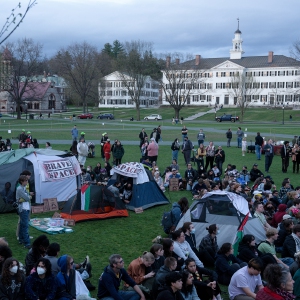A Life: Bob Dean ‘always had this notion there has to be a better way’
| Published: 09-12-2023 3:18 PM |
NORWICH — Bob Dean liked to ride his bicycle between his home in Norwich and work in Hanover and Etna. That wasn’t unusual — bike commuters are common around the towns.
What was uncommon is that Dean was likely the only one-legged cyclist to pedal the commute.
Dean, who lost his left leg when he was 14 years old in a tractor accident, removed the left pedal so that his prosthetic leg could hang freely while “cranking all the way” with his right leg the 6 miles between home and work, recalled his son, Charlie Dean.
“He couldn’t be stopped,” Charlie Dean said of his father. “He was a force of nature.”
Dean, a mechanical engineer, had a big hand in launching some of the most successful companies in the Upper Valley. Those companies, in turn, spawned numerous others. He applied his inventive imagination and skills to designing everything from plasma metal cutters to homemade labor-saving devices before dying Jan. 7 at his home in Norwich. He was 94.
If the Upper Valley had its own Thomas Edison, Bob Dean could hold that mantle, an inventor of restless curiosity and relentless energy in search of practical solutions to both esoteric challenges in industry and prosaic annoyances at home.
“Bob always had this notion there has to be a better way,” said Rick Greenwald, who with Dean co-founded Lebanon medical device maker Simbex. “And with that he would go off and solve a problem.”
Integral in the co-founding of such Upper Valley companies as Hypertherm, Creare and Fujifilm Dimatix, Dean had a collosal impact on the Upper Valley’s economy, launching companies that today collectively employ thousands of people. A tally by Dartmouth’s Thayer School of Engineering, where Dean taught mechanical engineering for decades, counts 28 U.S. patents under his name and lists 10 companies which he founded or co-founded.
Article continues after...
Yesterday's Most Read Articles
 Police seek assistance in locating missing Dartmouth student
Police seek assistance in locating missing Dartmouth student
 City cites Claremont property owner over demolition of building
City cites Claremont property owner over demolition of building
 Editorial: Dartmouth lets protesters know where they stand
Editorial: Dartmouth lets protesters know where they stand
 DHMC union organizers say they have enough signatures to force vote
DHMC union organizers say they have enough signatures to force vote
 A Life: Elaine Chase ‘was a very generous person’
A Life: Elaine Chase ‘was a very generous person’
Yet, contrary to the image of the successful high-tech entrepreneur, Dean never made a fortune in his business ventures, according to family members. That’s because he typically bowed out early and was on to his next project before the companies took off and the money rolled in. He was at times pressed to raise a family of five kids — two of whom became mechanical engineers and another who became a professor like their father — on a professor’s salary.
“It was the designing that was the adventure, not the possessing in the end,” Charlie Dean said of his father.
For the last 40 years, Dean and his wife of more than 71 years, Nancy — who died on July 7, six months to the day of Dean’s death — lived in an unpretentious house on Hawk Pine Road in Norwich.
The tractor accident when Dean was a teenager that crushed his leg and left him bleeding in the field for an hour before helped arrived profoundly shaped — in a positive way — the adult he was to become, according to family members. He disdained being seen as or called “handicapped,” family members attest.
“The accident made him who he is,” said Dean’s daughter, Lili Hermann, a professor at Rhode Island School of Design, who said it turned him from being what ordinarily might have been a “privileged” prep school boy and propelled “him to fight for the fact he could no longer be a partier or sports person in the way he had been and to use his brain.
“He was always smart, but he really had to use his brain after that,” she said.
And use his brain Dean did.
Entering Andover at near the bottom of his class, he graduated near the top.
He went on to the Massachusetts Institute of Technology, where he earned three degrees in mechanical engineering. Shortly afterward, he became one of the youngest ever to be appointed professor at MIT.
Dean worked in MIT’s jet engine laboratory until 1956 when he and Nancy — whom he met at a MIT-Wellesley dance where she was a student — moved to Easton, Pennsylvania. He took a job in industry there before moving to the Upper Valley in 1960, when he came to teach at Dartmouth’s Thayer School.
Nancy didn’t even know after the dance where they met that the handsome MIT student with whom she took turns around the dance floor had a prosthetic leg, so without affect did he move, Hermann said. The Deans went on to have five children: Margaret (Meg), James, Elizabeth (Lili), Martha and Charles.
After living in Plainfield for a few years, the Dean family moved into a 19th-century home smack in the center of Norwich, across the street from Dan & Whit’s General Store, today occupied by Carpenter & Main restaurant and business offices.
Dean’s family said their father’s values of independence were forged in his high school years during World War II, when his own father, an architect who designed college buildings and whose firm was selected for the restoration project of colonial Williamsburg, was away from home serving in the military and the teenage Dean had to work to help support his family.
Whereas others might have been depressed by such blows, Dean harnessed them into optimism.
Although unable to play team sports, Dean was undaunted at hiking, skiing, snowshoeing, canoeing and biking, chalking up thousands of miles on foot in well-worn shorts. As a scout master, he led his Norwich troop in winter survival camping expeditions and river trips on the Allagash and St. John in Maine.
Daughter Martha Dean, a Connecticut attorney, said via email her father’s exuberance for the outdoors is preserved in a memory of him bellowing, à la Teddy Roosevelt, “Bully! Bully!” as he biked “up the mountains in Northern Ireland against the wind.”
Her father imprinted a lifetime lesson, she related, when he “taught me how to earn my own money to purchase a horse at age 6,” she wrote, which led her to start her own lawn mowing service. He then further incentivized her by matching her earnings “dollar for dollar” going forward so that she could afford to care for her horse.
It was the kind of early lesson in self sufficiency that Dean instilled among all his children, said Meg Hurley, the eldest of the five Dean kids, who worked as a high school English teacher in Rochester, N.Y., before moving with her husband to Claremont. She is now a writer.
“He would always say to us, ‘You can have whatever you want as long as you earn it or make it yourself,’ ” Hurley said, noting that when she wanted to go to the United Kingdom at 16 years old, she had to purchase the plane ticket with her own earnings from babysitting jobs.
Dean’s Yankee ingenuity and self-sufficiency ethic led him to design and make devices to aid in his passion for enjoying outdoor sports with a prosthetic leg as well as everyday needs, such as a hand-operated clutch attached to his car’s stick shift and skis on which he rigged a braking system by pulling on a cord.
“That didn’t work too well,” Charlie Dean said of the ski braking system.
“Some of them had almost a Rube Goldberg-like quality,” Hurley said of her father’s home inventions, such as a system of pulleys to elevate and lower bird feeders.
“If there was something at home that needed fixing, it usually involved pulleys,” she said.
Dean’s ideas were jotted down in notebooks, which were never far from his reach.
“He was meticulous in his note-taking, whether for work or his own ideas,” said Charlie Dean.
“His life was full of his detailed technical notebooks,” affirmed Simbex’s Greenwald. “There were hundreds of them. They were full of inventions and new ideas and things that he wanted to follow up on.”
In later years, as Dean’s focus turned to aiding people, especially those with mobility challenges like himself, as they grew older, his sketchbooks were filled with novel designs, such as a track system on the ceiling from which was suspended a basket that could transport objects around the house.
At home, Dean would retreat into a workshop, a kind of home-based laboratory in the garage, where he would noodle on pet projects, such as an electric-powered bicycle, which Charlie Dean said his father was developing “20 years before” today’s e-bikes appeared on the market.
True to the image of the an otherworldly inventor, Dean had his quirks and idiosyncrasies, such as taking his lunch in a bag to eat at a restaurant while others, as was expected, ordered from the menu. He enforced a strict rule against watching TV in the house by technically disabling the TV set — which his kids naturally figured out how to reverse,
Around the dinner table, his daughter Meg Hurley said, family conversation was held to a high level, with their father posing math challenges for his kids to solve or a history question to debate.
“We had a set of the Encyclopedia Britannica nearby which we ran to,” Hurley recalled, when she and her siblings were stumped for the answer.
Martha Dean said her father “loved being around people who got excited about the same things he cared about — whether inventions, history or adventure.”
There were limits, however.
Charlie Dean said his father was warm and accepting of people with differences — he was irritated by those who touted their fancy education pedigree as if those were qualifications in themselves — but had certain impatience for people who displayed intellectually lazy thinking or, worse, no thinking at all.
“He was always looking for intelligent people to talk with,” said Charlie Dean. “And if he didn’t find that, well, you know, at some point it became kind of a limited conversation.”
Contact John Lippman at jlippman@vnews.com.











